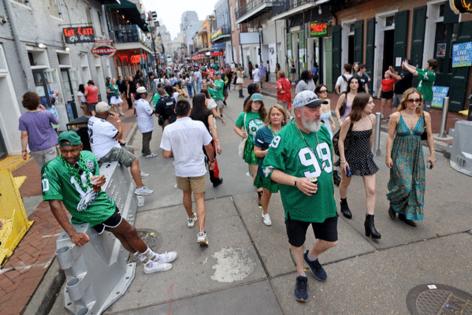State lawmakers take aim at 'black market' restaurant reservations
Published in News & Features
Lawmakers in several states are pushing bills to prohibit unauthorized sales of hard-to-get restaurant reservations.
Proposed bills in California, Florida, Illinois and Louisiana take aim at online platforms such as Appointment Trader that allow diners to sell coveted reservations on the open market — sometimes without a restaurant’s knowledge.
In Louisiana, the issue gained attention surrounding February’s Super Bowl, when one customer paid more than $2,000 for a table at a top New Orleans restaurant, the Louisiana Illuminator reported.
Proponents of the platforms say these services provide customer flexibility and can boost restaurant business. But restaurant groups have opposed their entry into the market, arguing that they undermine the dining experience and can leave restaurants with empty tables.
The Illinois and Louisiana legislation follows New York state’s Restaurant Reservation Anti-Piracy Act, which went into effect in February. The law aims at curbing the “black market” in which reservations are scooped up as soon as they go live, Gothamist reported.
The Louisiana Restaurant Association asked state lawmakers to file a similar measure.
Wendy Waren, spokesperson for the association, told the Louisiana Illuminator that online platforms are selling reservations without restaurant’s permission or knowledge. If no one purchases reservations, tables can sit empty, preventing legitimate customers from getting a reservation, Waren said.
“It creates artificial scarcity,” Waren said. “It’s like somebody’s hijacking the process.”
The Republican-sponsored bill, which would require platforms to have contracts with restaurants, is pending before the state House Commerce Committee.
A similar bill just won unanimous approval from the Illinois state House and now moves onto the state Senate for consideration.
The legislation would require a written agreement between restaurants and reservation platforms and would create a civil penalty of up to $1,000 for each violation of the new law.
State Rep. Margaret Croke, the Democrat who sponsored the bill, characterized the move as a “commonsense” measure to protect restaurants and consumers alike.
“At a time when local restaurants are operating with extremely tight margins and working to recover from the impacts of COVID-19, they shouldn’t have to deal with third-party services snatching up their reservations and selling them at a premium, which leads to no-shows and confusion that only hurts their bottom lines,” Croke said in a statement.
The laws do not affect a restaurant’s ability to contract with reservation platforms such as OpenTable and Resy, which have applauded state crackdowns on other third-party sites.
Jonas Frey, who founded Appointment Trader, told the New York Times he launched the platform to help people get tables for a “fair market price.”
Last summer, he acknowledged that computer bots making reservations and then selling them were an issue, and said he had tried to prevent them from exploiting the website. But he said his website had only become popular because it was already difficult to get a reservation, especially in the New York City area.
____
Stateline reporter Kevin Hardy can be reached at khardy@stateline.org.
©2025 States Newsroom. Visit at stateline.org. Distributed by Tribune Content Agency, LLC.







Comments